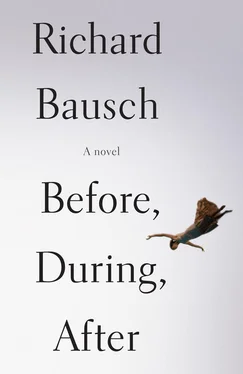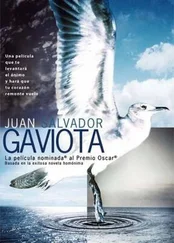“Thank you,” Natasha said. “You’ve been very kind.”
“I’m only giving you what the lawyers will think and do. You want to press charges?”
“I’ll decide and call you back.”
“I guess it’s not going to be helped or hurt by waiting a little longer. But let us know.”
She set the receiver in its cradle on the nightstand. She felt strangely vacant, exhausted, even apathetic. Nothing to be done. The idea of trying to paint anymore seemed dreary and negligible, an indulgence. Something from another life, far gone. She went into the little room and looked at what she had, then took it down and put it in the stack of other attempts. Then she went back into the bedroom and lay down again.
The doctor’s appointment was for eleven-thirty, but she had slept very little in the night, and so she put her arms around herself and looked at the room.
Once again she had to fight off the images: Nicholas Duego, untouchable by the authorities, arriving at the Memphis airport, renting a car, and driving into Midtown, taking a cheap motel room. Duego looking up the address she had written in the sand on the beach and finding his way there to watch her come and go, hunting her, planning something. Possessing the indemnity provided by her history and by the circumstances. But he would see that she was telling no one. Except that there was his craziness and his need to explain, his wanting her to say that what had happened was not what it was. I do not take what has not been given . His hands shoving the sand in her mouth, packing it there, trying to fill her throat.
Every passing car was peril.
She got up, went into the bathroom, brushed her hair, and said into the mirror, “I will not be a victim. I am not a victim. I am not . I’m not .”
Then she was sitting on the sofa in the small living room, crying softly and waiting for the time to pass. She did not even remember how she got there.
When the shadow appeared in the window of the front door she took in a breath and stiffened. The knock brought a little yelp out of the back of her throat. She rose and moved with stealth to the window in the small dining room and peered out.
Marsha Trunan.
She went to the front door and opened it.
“We were supposed to go for a walk,” Marsha said. “Remember?”
It was just past nine o’clock.
“I didn’t remember,” Natasha said to her. “Give me a minute.”
The other woman entered and sat at the table, refusing the offer of coffee but taking a clementine from the bowl there and peeling it and eating it. Natasha put her tennis shoes on, and a light sweatshirt.
“Ready?” Marsha said, chewing. Then: “You really don’t remember telling me to come by at nine today?”
“I remember now,” Natasha told her.
They walked up the leaf-strewn sidewalk. Neither of them spoke for a few paces. There was a cool breeze blowing intermittently, but the air was warm, still summery.
“I think I might be pregnant,” Natasha said.
The other looked at her and kept walking with arms folded. “And?”
She shrugged and repeated, without inflection, “I might be pregnant.”
“You don’t sound very happy about it.”
“I think I’m happy.”
“You think you’re happy.”
“Well, it’s — scary. A little scary.”
“You always said you wanted a baby. You’ve been saying that for a while.”
“I know. I do.”
“Well?”
“I don’t know for sure what he wants. I mean — he’s about to be fifty.”
“You don’t know how he’ll feel about it?”
“Not for sure — no.”
“You’re married . What do you talk about, anyway, that you can’t be sure what he’ll think about the fact that you’re pregnant?”
“He’s said he wants a family.”
“Well, then.”
“But that’s talk.”
“Well, hey — I mean — Jesus, if you can’t trust that kind of talk — I’m sorry — but what the hell.”
“Stop it, Marsha.”
They went on a little without saying anything.
When Marsha spoke now, it was in a quiet, almost chastened tone. “I just mean I bet he’ll be fine with it.”
A car went by with the radio loud, a voice speaking in Spanish. Natasha shrank back a little, watching it go by. A woman sat behind the wheel.
“You seem a bit jumpy,” Marsha said. “Part of being in your condition?”
“I guess.”
Presently, she said, “So how far along are you?”
“I don’t know exactly. They’ll tell me. Eight weeks?”
“Must’ve happened wedding night, huh?”
Natasha looked at her. “Whatever. Whenever.”
“If there was something really wrong between you guys, you’d tell me, right?”
She stopped, and Marsha stopped, too. They were standing on the corner where a light flashed red numbers, the seconds they had to cross. She thought of a countdown toward some disaster. She faced her friend. They were two women, paused at a crossing. Natasha had the thought that there had always been something absent in the other. “I don’t understand,” she said.
“You’re happy with him.”
“ Yes , I’m happy with him. What a question, Marsha, for God’s sake.”
“Well, I mean he is older than you are. I don’t want to pry. But something looks not right. I’m sorry. You’d tell me, wouldn’t you?”
Natasha crossed the street. Her pace was that of someone walking alone. She turned and headed down to the next block, so they could come back to the house. Her friend walked along at her side, without saying more.
“I have a doctor’s appointment,” Natasha told her.
“Look, I’m sorry. I didn’t mean to upset you.”
She stopped. “How about you, Marsha. How is your love life?” Marsha had been seeing a pharmacy student at the university, someone she’d spoken about in rather cold terms as being good looking but not very interesting.
“Oh, let me tell you,” she said, looking down. Natasha saw something uncertain in her eyes. “That’s over. I sent him packing. I’m free. And loving it.”
Natasha touched her shoulder. “You said he was a bit boring.”
“Deadly. But he was pretty. I guess he thought that was all he needed. You should’ve seen the look on his face when I told him I didn’t want to see him anymore. Like a kid being told there’s no Santa Claus and for a few seconds refusing to accept the knowledge. I swear his lower lip stuck out. It about broke my heart. I almost told him I was kidding.”
“Poor guy.”
“Look, I really didn’t mean to upset you.”
They walked on. “It’s okay. Really.”
“Just trying to help. I mean I know depression when I see it.”
“And you think you see it.”
Marsha frowned. “Well, yes.”
“I’m not depressed.”
“Constance told me what she saw that night in Jamaica.”
They had reached Iris’s street. Natasha halted again and looked at her. “I should’ve known.”
“I told her it doesn’t have to mean anything.”
“When did she tell you?”
“That night before the wedding.”
“Oh, God. My friend Constance.”
“She’s just worried about you.”
“Yes, the same way she was worried when she told you about Mackenzie and me.”
“She really didn’t know what to do. She told me about — it was about messing things up that day. How she wanted to let you know she believed you about it, and she got it all wrong. She was worried.”
“And she told you about it.”
“Please don’t be angry with her, Natasha. She was really worried, and it was about what she might have done to hurt you. Really. And then Michael seemed to know something.”
Читать дальше












